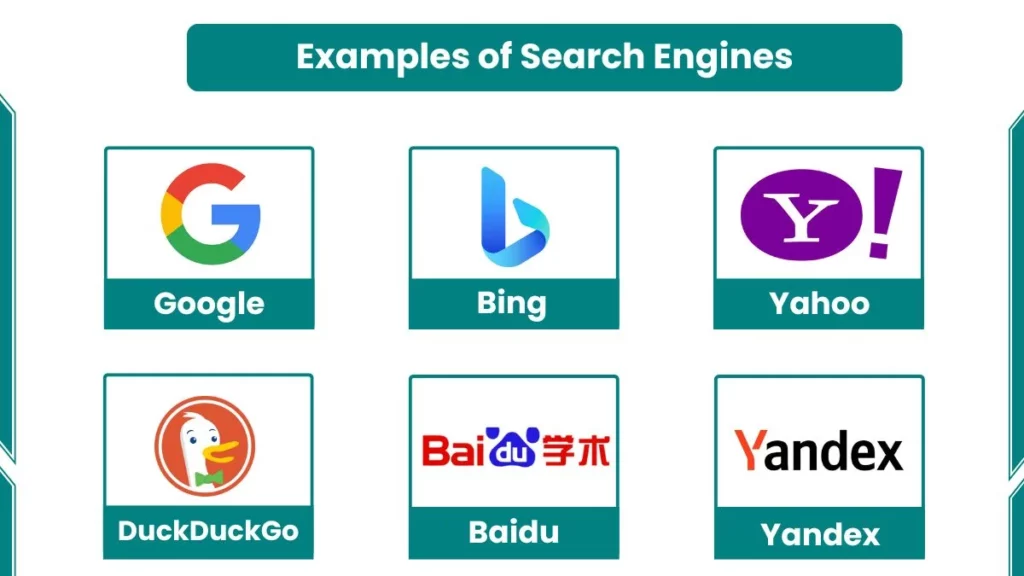With over 4.5 billion people online, there are more than 6.5 billion searches every day. Learning to use top search engines well is essential for finding information easily. In this article below, we’ll look at the 10 most common examples of search engines in the world. We’ll cover popular ones like Google and Bing, as well as unique search engines that meet specific needs.

Examples of Search Engines in Computer
The following are examples of search engines in the world:
1. Google
- Market Share: ~92% of global search engine traffic (2024)
Founded in 1998 by Larry Page and Sergey Brin, Google is the most widely used search engine globally, processing over 3.5 billion searches daily. Google’s powerful algorithms provide accurate, personalized results based on user behaviour, location, and search history.
Key Features
- PageRank Technology: Uses links between websites to rank search results.
- Voice Search: Supports voice-activated searches.
- Mobile-First Indexing: Prioritizes mobile-friendly sites.
- Knowledge Panels: Displays concise information on famous people, places, and topics.
- Google Lens: Allows mobile users to do visual searches with images.
Specialized Tools
- Google Scholar
- Description: Offers academic papers and citations.
- Ideal For: Students and researchers.
- Pro Tip: Add “scholar” before your search terms for precise academic results.
- Google Images
- Description: Provides image search and reverse image search.
- Pro Tip: Use “filetype:” to filter image formats (e.g., PNG, JPG).
Did You Know? Google can be a calculator, unit converter, or even a timer! Just type “timer 5 minutes” in the search bar.
2. Bing
- Market Share: 8-9% globally, primarily in the U.S. and Europe.
Microsoft develops it. Bing is Google’s closest competitor, known for its visually rich search experience. Bing is especially popular with users seeking alternative search engines with added integration to Microsoft products.
Key Features
- Visual Search: Use images to search for similar visuals.
- Rewards Program: Users earn points redeemable for gift cards and donations.
- In-SERP Solutions: Offers weather forecasts, sports scores, and more without leaving the page.
Best For
- Visual content searches. It rewards enthusiasts and Microsoft Office users.
3. Yahoo
- Market Share: Less than 2%, known for its portal-style homepage.
Once a search giant, Yahoo offers a mix of search and media services. Its homepage remains a hub for news, sports, finance, and email.
Key Features
- Yahoo Finance: Comprehensive market and finance data.
- Community Features: Includes question-answer platforms and chat services.
Best For
- Users looking for a blend of news, finance, and search.
4. DuckDuckGo
- Market Share: DuckDuckGo’s share is estimated at around 2%, which aligns.
DuckDuckGo is a privacy-focused search engine. It does not track user activity, so it’s popular among users who value anonymity.
Key Features
- No Tracking: Ensures no user data is stored.
- Bang Searches: Use shortcuts, like “!w” to search directly on Wikipedia.
Quick Tips
- Add DuckDuckGo to your browser for privacy.
- Use bangs (! followed by a site abbreviation) to search specific sites quickly.
Best For
- Privacy enthusiasts, anonymous browsing.
5. Baidu
- Market Share: Baidu dominates China with over 70% share, as mentioned.
Baidu is the top search engine in China. It’s optimized for Chinese-language users and offers specialized features for local content and social media integration.
Key Features
- Chinese Language Support: Delivers high-quality Chinese search results.
- Multimedia Search: Searches for images, videos, and news in Chinese.
Best For
- Chinese-speaking users, local searches within China.
6. Yandex
- Market Share: Yandex leads Russia with over 50% share.
Yandex is the most popular search engine in Russia. It provides many services tailored for Russian-speaking users. It offers maps, translation, and shopping tools.
Key Features
- Maps and Transport: Offers Russian-specific maps and directions.
- Yandex.Translate Language support for Russian and other languages.
Best For
- Russian speakers and regional content seekers.
7. Ask.com
- Market Share: Niche, mainly for question-based queries.
Ask.com uses a question-answer format. It’s designed for simple questions and is ideal for users who want community-driven responses.
Key Features
- User-Generated Content: Allows community answers and contributions.
Best For
- Basic Q&A and trivia-style queries.
8. AOL Search
- Market Share: Very low, mainly used by loyal AOL users.
AOL Search is part of the AOL ecosystem. It blends news and entertainment with basic search functions. It offers news, entertainment, and historical content. Popular in the early days of the Internet. AOL Search has a nostalgic value for many users.
Best For
- Users seeking a nostalgic internet experience with AOL integration.
9. Ecosia
- Market Share: Small but growing among eco-conscious users.
An eco-friendly search engine that uses its ad revenue to plant trees. Simple and clean interface, with a focus on environmental impact. For every search, Ecosia donates to tree-planting projects. This makes it an excellent choice for environmentally conscious users.
Key Features
- Tree Planting: Supports global tree-planting projects from ad revenue.
Best For
- Eco-conscious users who want to contribute to sustainability efforts.
10. Wolfram Alpha
- Market Share: Small but popular in academic circles.
A “computational knowledge engine” designed to answer factual questions. Computes answers directly from data rather than just displaying links. Excellent for science, math, and data-based queries, as it calculates solutions in real time.
Best For
- Math, science, and data-related queries.
